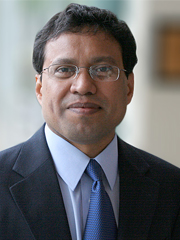Keynote Speakers
Converged Internet and Broadcast Media Delivery
Speaker: Michael Luby, Vice President, Technology, Qualcomm, Inc.
Monday June 15th 9:00 AM Room: CGS 129
Abstract: Over the past few years there has been significant progress towards realizing the vision of a converged Internet and Broadcast media delivery system. Convergence means providing a seamless user experience and reusing the same technologies to provide common functionality (reducing costs and increasing compatibilities), while maintaining the personalization benefits of the Internet and the scalability benefits of Broadcast. In this talk I will describe some of the technologies employed for Internet and Broadcast media delivery, describing commonalities as well as differences.

Bio: Mike Luby, Vice President, Technology, Qualcomm, Inc, focuses on advanced research, including broadcast multimedia delivery, Internet streaming, and reliable distributed storage. He has been recognized for his work in coding theory, cryptography and content delivery technologies, including the IEEE Richard W. Hamming Medal, the ACM SIGCOMM Test of Time Award, the IEEE Eric E. Sumner Communications Theory Award, and the ACM SIAM Outstanding Paper Prize. Mike earned a BSc in Applied Math from M.I.T. and a PhD in Theoretical Computer Science from UC Berkeley. He is a member of the National Academy of Engineering and is an IEEE Fellow.
Smart-Sensing using Smart-Sensors
Speaker: Prasant Mohapatra, University of California, Davis.
Tuesday June 16th - 8:30AM Room: CGS 129
Abstract: With the expansive usage of mobile devices and potential growth in the deployment of Internet of things, we will have proliferation of smart sensors in our handheld devices, wearables, and in our surroundings. Making sense out of the web of sensors is what we term as Smart-Sensing. Smart-Sensing would involve accurate and innovative sensing approaches while using minimal resources. In this talk, we will have an overview of a few approaches and novel ideas for Smart-Sensing using Smart-Sensors. Capturing the movement of fingers and hand gestures through accelerometer and gyroscope, we will develop the concept of finger-writing using smartwatches. Then we will explore how the WiFi APs can detect the movement of other devices at a fine granular level. Sensor assisted biometric authentication will be the next topic of our discussion. The last part of the talk will demonstrate the use of accelerometer for detecting voice and we will propose the use of this concept for saving energy consumption in smart devices. The talk will conclude with the summary of the potential scope and applications of Smart-Sensing environments.

Bio: Dr. Prasant Mohapatra is a Professor in the Department of Computer Science and serves as the Associate Chancellor of the University of California, Davis. He is the former Tim Bucher Family Endowed Chairman of the department. In the past, he has held Visiting Professor positions at AT&T, Intel Corporation, Panasonic Technologies, Institute of Infocomm Research (I2R), Singapore, and National ICT Australia (NICTA), University of Padova, Italy, Korea Advanced Institute of Science and Technology (KAIST), and Yonsei University, South Korea. He is the Editor-in-Chief of the IEEE Transactions on Mobile Computing, and has served on the editorial boards of the IEEE Transactions on Computers, IEEE Transactions on Mobile Computing, IEEE Transaction on Parallel and Distributed Systems, ACM WINET, and Ad Hoc Networks. He has been on the program/organizational committees of several international conferences. Dr. Mohapatra is the recipient of an Outstanding Engineering Alumni Award from Penn State University, an Outstanding Research Faculty Award from the College of Engineering at the University of California, and the HP Labs Innovation Research Award winner for three years. He is a Fellow of the IEEE and AAAS. Dr. Mohapatra's research interests are in the areas of wireless networks, mobile communications, sensor networks, Internet protocols, and QoS. Dr. Mohapatra's research has been funded through grants from the National Science Foundation, Department of Defense, Intel Corporation, Siemens, Panasonic Technologies, Hewlett Packard, Raytheon, Huawei Technologies, and EMC Corporation.
News
- 16Apr
Student Travel Grants available.
For instructions please visit:
[Travel Grants Page] - 19Mar
N2 Women Young Researcher Fellowship awards instructions available under [Travel Grants]
- 14Jan
[Workshops] [Demos] [Ph.D. Forum] webpages available
- 20Nov
Paper deadlines have been extended to November 28 (registration) and December 8 (submission)
- 16Sept
EDAS Submission Link is active.
- 16Jun
Call for Papers Released
- 15Jun
WoWMoM Website Active